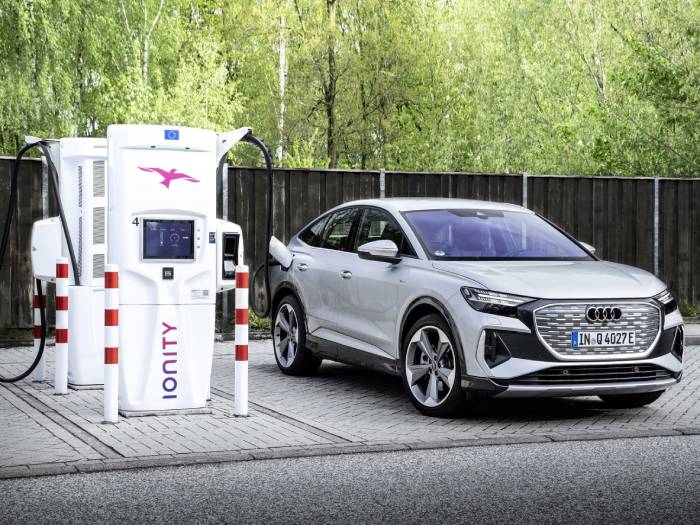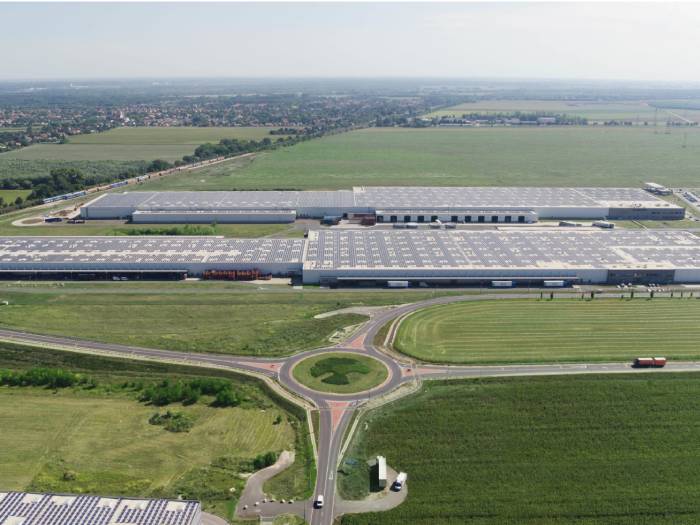Audi promotes the supply of energy from renewable sources in Europe
Through partnerships with energy providers, Audi is supporting the creation of wind and solar farms in various European nations which will feed a total of 5 TWh of green electricity into the grid by 2025. This will allow electric vehicles to be carbon neutral throughout their entire life cycle.
Becoming a zero-emissions mobility provider requires an all-round approach. This is precisely what Audi is doing, having recently announced it is partnering with various energy providers to support the expansion of renewable energy sources. The ultimate goal of these partnerships is to build new wind and solar farms in various European countries by 2025, which together are expected to generate around 5 TWh of additional green power, corresponding to the installation of about 250 new wind turbines.
The aim is for the proportion of electricity generated from renewable sources to increase along with the growing proportion of electric cars. The first in a long series of projects has already begun in Germany: a solar park in the state of Mecklenburg-Vorpommern, which will come on stream in 2022 and is designed for a total capacity of 170 million kWh. Encompassing nearly 420,000 solar panels, it will be one of the largest independent solar parks in Germany.
Life cycle
The life cycle of an automobile is conventionally divided into three stages: manufacturing, utilisation and recycling. The first also includes the extraction of raw materials and component manufacturing, while the second includes the supply of fuel or electricity. Taking the entire vehicle life cycle into consideration, Audi aims to reduce the carbon footprint of its fleet by 30% by 2025.
By partnering with European energy suppliers, Audi aims to successively decarbonise the utilization stage. When it comes to electric cars, one of the most important factors is the power used to charge them, as they do not emit carbon dioxide on the road, but the generation of electricity does. This varies greatly depending on whether fossil fuels or renewable sources are used to generate it.
Green energy

Audi is committing directly to support the generation of electricity from renewable sources to also cover charging which does not currently use green energy. The goal is to minimise this. Audi customers in Germany can already use the green power solutions offered by Volkswagen subsidiary Elli to charge their cars at home today. For public charging, on the other hand, the IONITY charging network and many other charging point operators already rely on renewable energy.
“We’re working hard to make carbon-neutral mobility possible. The expansion of renewable energy sources at an industrial scale is the next, logical step” explains Oliver Hoffmann, Member of the Board of Management for Technical Development.
Production
Audi had already launched a program to reduce CO2 emissions in the supply chain back in 2018, working with its direct suppliers to make the supply chain, and consequently production, more efficient. Projects such as the use of green energy, closed material cycles, and gradually increasing the use of secondary and recycled materials offer concrete potential for reducing CO2 emissions.
In the years to come, projects like this will become ever-increasingly important for Audi and its suppliers. The use of green energy has already been an integral part of supplier contracts with high-voltage battery cell manufacturers since 2018. Audi analyses the effectiveness of these measures, which also apply to subcontracted suppliers, on the basis of life cycle analyses and has them certified by independent third parties.
Mission:Zero

Mission:Zero is the program that includes all of Audi’s activities to reduce the environmental footprint of its production sites worldwide; by 2025, they must all become carbon neutral. Audi Brussels already achieved this goal in 2018, Audi Hungary followed in 2020; all of Audi’s European production sites already exclusively source green power. Audi e-tron GT manufacturing at Böllinger Höfe and Audi Q4 e-tron manufacturing at the Zwickau factory are both carbon-neutral production processes. All e-tron models sold to customers in Europe and the USA will be delivered to the end customers with a net-zero carbon footprint.
All inevitable emissions from the supply chain, production and logistics that cannot be prevented are offset through carbon credits that support measures to combat climate change. These are certified by the non-profit organizations The Gold Standard or Verified Carbon Standard.
Source: AUDI AG
